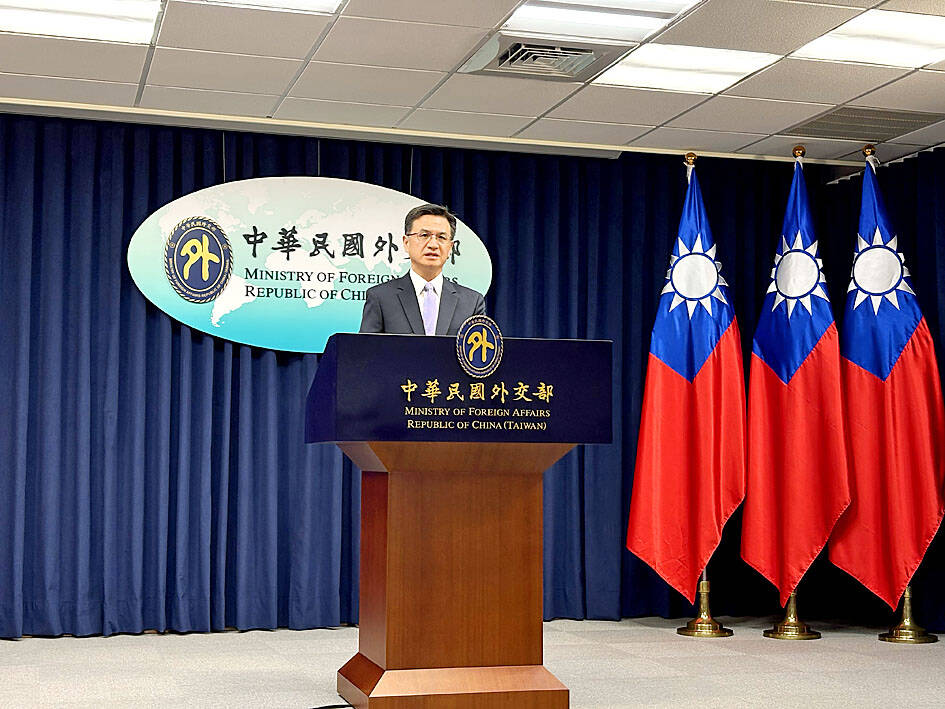The Taiwan Strait is international waters, not China’s “inland waters” as it claims, the Ministry of Foreign Affairs (MOFA) said yesterday, as expressed gratitude to like-minded countries for voicing concern about China’s military exercise around Taiwan on Monday.
The Chinese People’s Liberation Army (PLA) on Monday launched military drills, called “Joint Sword-2024B,” in the Taiwan Strait and surrounding Taiwan, which it said served as “a stern warning to the separatist acts of Taiwanese independence forces.”
The one-day joint drills came four days after President William Lai (賴清德) reiterated that the Republic of China and the People’s Republic of China are “not subordinate” to each other, in his first Double Ten National Day address.

Photo: Huang Chin-hsuan, Taipei Times
The MOFA strongly condemns the PLA’s drills, ministry spokesman Jeff Liu (劉永健) said.
“The Taiwan Strait is international waters, not inland waters as China claims,” he said, adding that Taiwan is not only in the center of the first island chain, but also plays a crucial role in the “non-red supply chain” and democratic global value chain.
“Maintaining freedom, openness and peace in the Taiwan Strait and the Indo-Pacific region is already an international consensus,” he said.
The ministry also expresses its regards and sincere gratitude to like-minded countries for expressing serious concerns shortly after China launched its military drills, and for reiterating their opposition to unilateral actions to change the “status quo” in the Strait, and urging China to show restraint, he said.
The US Department of State said the US is “seriously concerned” about the PLA’s “unwarranted” and “provocative” drills, while Japanese Prime Minister Shigeru Ishiba and the Japanese ministers of foreign affairs and defense also stressed the importance of peace in the Strait.
The EU warned against “unilateral actions” that change the “status quo” in the waterway.
The UK said it was concerned by China’s military exercises around Taiwan as they increased tensions and risked a “dangerous escalation” in the Strait.
“We do not support any unilateral attempts to change the status quo... We call for restraint and the avoidance of any further actions that may undermine peace and stability,” the British Foreign, Commonwealth and Development Office said in a statement.
Shortly after announcing the completion of the drills on Monday, the Chinese Ministry of National Defense issued a statement saying the exercise was an increase in pressure against Taiwanese independence, and that more could follow.
The Pentagon strongly criticized the Chinese military’s war games, calling them destabilizing.
“This military pressure operation is irresponsible, disproportionate and destabilizing,” Pentagon spokesman Major General Patrick Ryder said in a statement.
Japan yesterday expressed its “concerns” to China over the drills, adding that it scrambled fighter jets near its southern island of Yonaguni.
“The government is closely monitoring the related activities with great interest, and has conveyed Japan’s concerns to the Chinese side,” Japanese Deputy Chief Cabinet Secretary Kazuhiko Aoki told reporters.
Additional reporting by Reuters and AFP

ALIGNED THINKING: Taiwan and Japan have a mutual interest in trade, culture and engineering, and can work together for stability, Cho Jung-tai said Taiwan and Japan are two like-minded countries willing to work together to form a “safety barrier” in the Indo-Pacific region, Premier Cho Jung-tai (卓榮泰) yesterday said at the opening ceremony of the 35th Taiwan-Japan Modern Engineering and Technology Symposium in Taipei. Taiwan and Japan are close geographically and closer emotionally, he added. Citing the overflowing of a barrier lake in the Mataian River (馬太鞍溪) in September, Cho said the submersible water level sensors given by Japan during the disaster helped Taiwan monitor the lake’s water levels more accurately. Japan also provided a lot of vaccines early in the outbreak of the COVID-19 pandemic,

Kaohsiung Mayor Chen Chi-mai (陳其邁) on Monday announced light shows and themed traffic lights to welcome fans of South Korean pop group Twice to the port city. The group is to play Kaohsiung on Saturday as part of its “This Is For” world tour. It would be the group’s first performance in Taiwan since its debut 10 years ago. The all-female group consists of five South Koreans, three Japanese and Tainan’s Chou Tzu-yu (周子瑜), the first Taiwan-born and raised member of a South Korean girl group. To promote the group’s arrival, the city has been holding a series of events, including a pop-up

TEMPORAL/SPIRITUAL: Beijing’s claim that the next Buddhist leader must come from China is a heavy-handed political maneuver that will fall flat-faced, experts said China’s requirement that the Dalai Lama’s reincarnation to be born in China and approved by Beijing has drawn criticism, with experts at a forum in Taipei yesterday saying that if Beijing were to put forth its own Dalai Lama, the person would not be recognized by the Tibetan Buddhist community. The experts made a remarks at the two-day forum hosted by the Tibet Religious Foundation of His Holiness the Dalai Lama titled: “The Snow Land Forum: Finding Common Ground on Tibet.” China says it has the right to determine the Dalai Lama’s reincarnation, as it claims sovereignty over Tibet since ancient times,

Temperatures in some parts of Taiwan are expected to fall sharply to lows of 15°C later this week as seasonal northeasterly winds strengthen, the Central Weather Administration (CWA) said today. It is to be the strongest cold wave to affect northern Taiwan this autumn, while Chiayi County in the southwest and some parts of central Taiwan are likely to also see lower temperatures due to radiational cooling, which occurs under conditions of clear skies, light winds and dry weather, the CWA said. Across Taiwan, temperatures are to fall gradually this week, dropping to 15°C to 16°C in the early hours of Wednesday